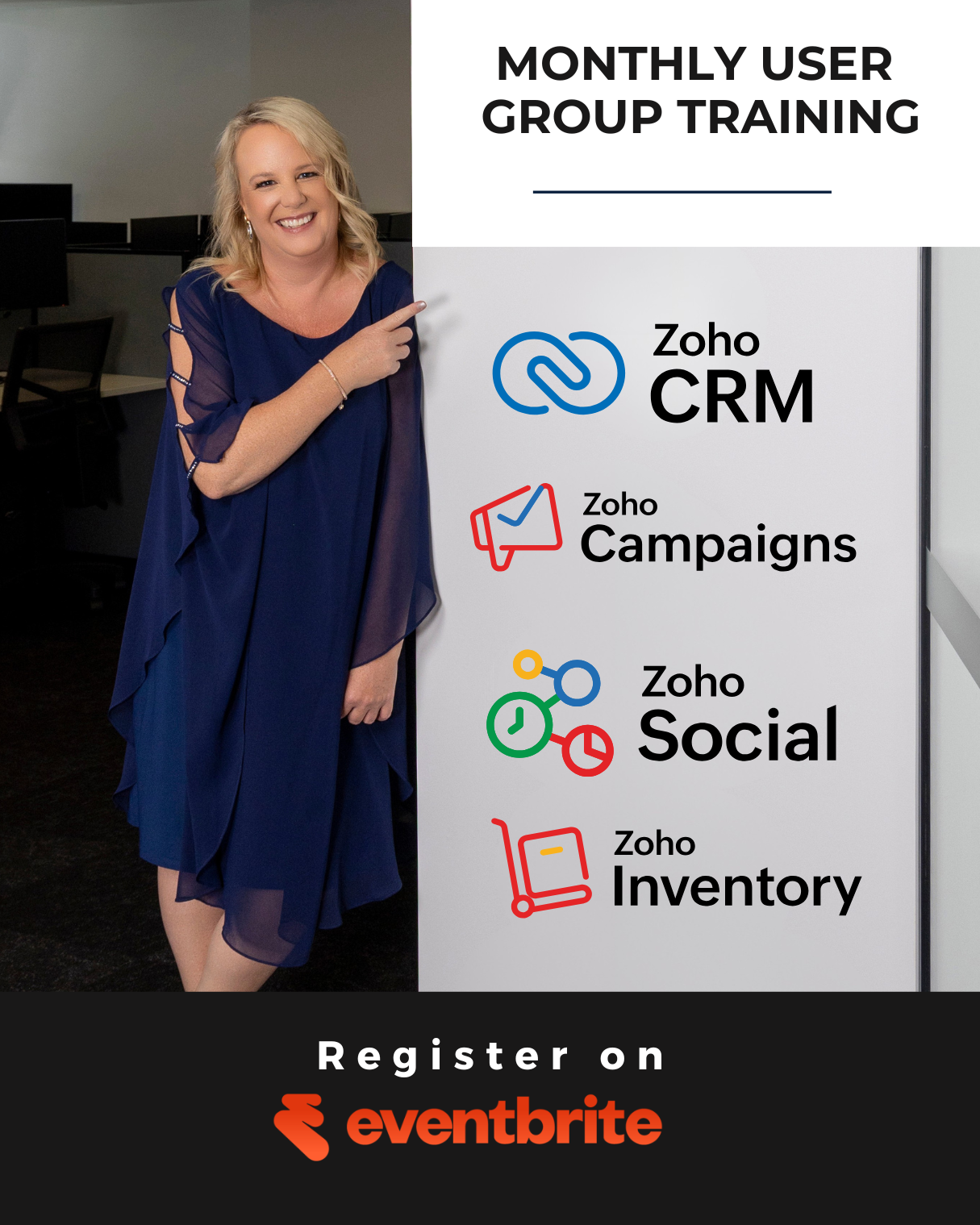Single Blog
- Home
- How to Set Up Effective Zoho CRM Deal Stages
Help Links
Zoho Q&A
- Where to Start with Zoho: Strategy Before Software
- Things to Consider When Choosing a Zoho Developer for Your Business
- Learn How to Customise Zoho Yourself
- Zoho Books vs. Xero: Expert Advice from Zoho Partners on Custom Solutions & Integrations
- Zoho CRM vs. HubSpot: Expert Advice from Zoho Partners
- Zoho CRM vs. Zoho Bigin
Contact Information
Address: Kontiki, Tower 1, 508/55 Plaza Parade, Maroochydore
Email: info@dynamicdigitalsolutions.com.au Website: dynamicdigitalsolutions.com.au
Copyright © Dynamic Digital Solutions. All rights reserved.





How to Set Up Effective Zoho CRM Deal Stages
At Dynamic Digital Solutions, we know that setting up effective Zoho CRM deal stages is crucial for streamlining your sales process.
Well-defined stages help you track progress, forecast accurately, and close deals faster. In this post, we’ll guide you through the process of creating and optimising your Zoho CRM deal stages.
Get ready to transform your sales pipeline and boost your team’s performance.
What Are Zoho CRM Deal Stages?
Definition and Purpose
Zoho CRM deal stages represent the steps a potential sale takes from initial contact to closing. These stages form the foundation of your sales process, providing a clear view of each opportunity’s status.
The Impact of Well-Defined Stages
Well-defined deal stages can revolutionise a sales pipeline. They offer structure, enhance forecasting, and increase team efficiency. With your pipeline stages and conversion probability of said stages mapped out, you can now start looking at your revenue targets.
Aligning Stages with Your Sales Process
Your deal stages should reflect your unique sales journey. Map out your current process by identifying key milestones from lead to close. A typical B2B software sale might include stages such as:
Each stage requires clear entry and exit criteria, helping your team determine when to move a deal forward.
Measurable Benefits
Implementing well-structured deal stages in Zoho CRM produces tangible results. According to a study by CSO Insights, organisations with a defined sales process experienced a 28% higher win rate compared to those without.
Customisation: The Key to Success
While best practices exist, your deal stages should be unique to your business. Zoho CRM’s flexibility allows for extensive customisation. You can add custom fields, set up workflows to automatically assign leads, send follow-up emails, or update deal stages, and create validation rules to ensure data quality.
Tailoring your deal stages to your specific needs will yield more accurate insights and a smoother sales process. Zoho CRM lets you create distinct sales pipelines that can be customised with the different stages to suit your sales process.
As we move forward, we’ll explore the best practices for setting up these deal stages in Zoho CRM, ensuring you maximise the potential of this powerful tool.
How to Create Effective Deal Stages in Zoho CRM
Zoho CRM transforms your sales process with features such as automation, multi-channel communication, and conversational AI. Here’s how to create deal stages that work for your business:
Map Your Sales Process
Start by outlining your current sales process. Identify the key steps from initial contact to closing a deal. A typical B2B software sale might include Qualification, Needs Assessment, Demo, Proposal, Negotiation, and Closed. Each stage should represent a distinct step in your sales journey.
Choose Clear and Concise Names
Clarity is paramount when naming your deal stages. Use simple, action-oriented names that your team can easily understand and remember. For instance, “Qualified Lead” communicates more clearly than “Initial Contact Phase.” Avoid jargon or complex terms that might confuse your team or clients.
Determine the Optimal Number of Stages
Try to create 5-7 stages for your sales process. Too few stages can lead to a lack of detail, while too many can overcomplicate the process.
Consider your sales cycle length and complexity when setting up stages in Zoho CRM. A short sales cycle might only need 4-5 stages, while a complex B2B sale could require 6-7.
Set Accurate Probability Percentages
Assign probability percentages to each stage for accurate forecasting. These percentages represent the likelihood of closing a deal at each stage. For example:
Base these percentages on your historical data. If you’re just starting, use industry benchmarks and adjust as you gather more data. Zoho CRM’s reporting features can help you analyse your win rates over time to refine these percentages.
Align Stages with Customer Actions
Make each stage correspond to a specific action or milestone in the customer’s journey. For instance, moving from “Needs Assessment” to “Demo” might require the customer to agree to a product demonstration. This alignment ensures that your stages reflect real progress in the sales process.
Now that you’ve set up your deal stages, it’s time to customise and optimise them in Zoho CRM to maximise their effectiveness.
How to Customise Zoho CRM Deal Stages for Maximum Impact
Enhance Stages with Custom Fields
Custom fields in your Zoho CRM deal stages capture vital information. The Deal Stage field is available by default in the Deals module, with some system-defined stages such as qualification, need analysis, and value proposition. This approach allows you to track essential data throughout the sales process.
Companies that use custom fields in their CRM experience an increase in sales team productivity. The right information at each stage empowers your team to make data-driven decisions and close deals faster.
Implement Automated Actions Between Stages
Zoho CRM’s automation features streamline your workflow. Set up automated actions to trigger when a deal moves between stages. For example, when a deal enters the Proposal stage, the system can automatically generate and send a proposal document to the client.
Sales teams that use automation tools increase their productivity. This approach not only saves time but also ensures consistency in your sales process.
Analyse Stage Duration to Identify Bottlenecks
Zoho CRM’s analytics features help you track how long deals spend in each stage. This insight identifies bottlenecks in your sales process. If deals consistently stall in the Negotiation stage, it might indicate a need for additional sales training or resources.
Companies that regularly analyse their sales pipeline can increase their conversion rates. Monitoring stage duration helps you pinpoint areas for improvement and optimise your sales funnel.
Implement Stage-Specific Validation Rules
Create validation rules for each deal stage to ensure data quality and completeness. For instance, require a budget estimate before a deal moves to the Proposal stage. These rules maintain data integrity and guide your sales team through the necessary steps at each stage.
Utilise Visual Pipeline Management
Take advantage of Zoho CRM’s visual pipeline management features. This allows your team to drag and drop deals between stages, providing a clear overview of the sales process. The visual representation helps identify deals that need attention and allows for quick updates to deal status.
Final Thoughts
Effective Zoho CRM deal stages transform your sales process. You create a solid foundation for success when you map your sales journey, choose clear stage names, and determine the optimal number of stages. Customisation maximises the impact of your Zoho CRM deal stages. You streamline workflows and identify areas for improvement when you add custom fields, implement automated actions, and analyse stage duration.
Regular review and refinement of your Zoho CRM deal stages ensure your sales process evolves with your business. You optimise your pipeline when you analyse data, gather feedback from your sales team, and adjust stages accordingly. This ongoing optimisation aligns your Zoho CRM setup with your business goals and market dynamics.
Dynamic Digital Solutions specialises in optimising Zoho CRM setups for businesses. We offer a free discovery session, customisation workshop, and ongoing support to ensure your Zoho CRM deal stages drive productivity and enable business growth. You can transform your sales process, boost team performance, and achieve sustainable business growth with well-structured Zoho CRM deal stages.
Categories
Recent Posts
Recent Comments
Archives
Categories
Recent Post
How to Set Up Effective Zoho CRM
June 23, 2025Zoho CRM Plus: Boost Your Sales and
June 21, 2025How to Create Effective Zoho CRM Dashboards
June 20, 2025Tags